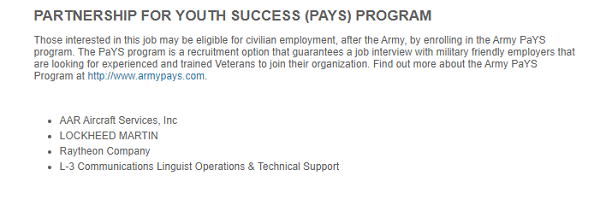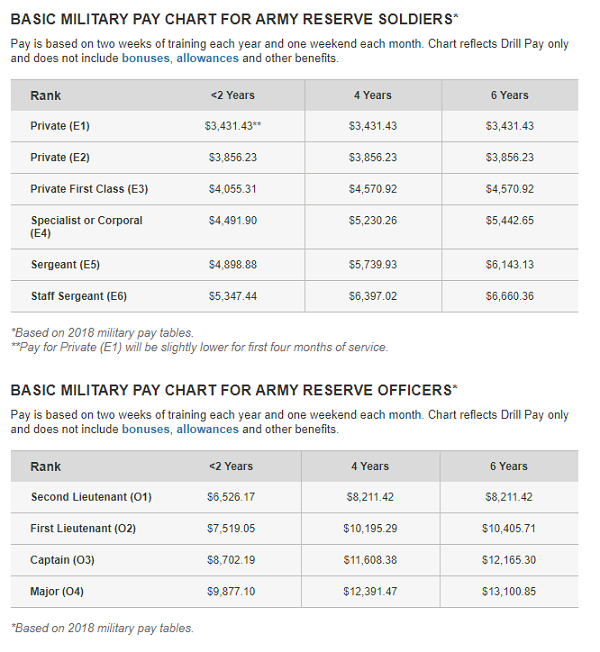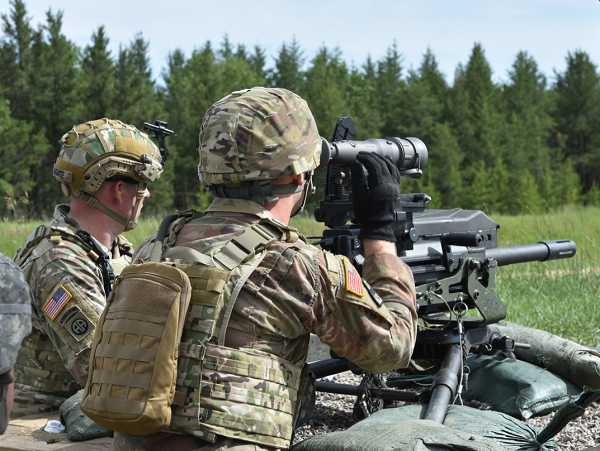Being in the Army Reserves provides flexibility, additional income, and training for a successful future.
Army Reserve benefits set you and your family up for success now, and with a future civilian career.
Army Reserve benefits extend to more than just medical and dental insurance.
They have programs, resources, pay and partnerships that foster relationships, career opportunities and provide skill development.
Continue reading for five benefits you may not know the Army Reserve offers to its members.
Related Article: Army Reserves Vs. National Guard
Jump To A Section
1. PaYS Program

The Army’s Partnership for Youth Success (PaYS) program is an opportunity to help both Army Veterans and businesses.
The PaYS program allows soldiers to have a job interview with a partner company of their choice once they have completed service.
During the recruiting process, soldiers who choose to participate in the program will begin establishing relationships with companies they are potentially interested in working for.
While this is not a guaranteed job, it does put you one step ahead of the competition by allowing you to build a relationship prior to your service.
In a world where applications are submitted online, sometimes the hardest part of a job search can just be having an opportunity to meet with the employer in person and explain why you are the right candidate for the job.
The list of available employers is not small.
It has over 500 employers, in many different areas.
Related Article – Army Basic Training Locations: Details on all 4 boot camp locations
This program not only helps the soldier, it is meant to help provide disciplined and valuable workers to the employers and allow them to see the Army as a recruiting source for their business.
ROTC Cadets can select two PaYS employer partners and are eligible for an interview after completing college requirements.
There are two ways to review a list of PaYS partners for the Army.
First, when looking at MOS career descriptions on the Army website, a list of relevant partners to the job duties of that specific MOS can be found on the bottom of the page.

You can also find a complete list of Army PaYS partners can be found here.
Related Article: Air Force Reserve Benefits
2. Army COOL
The Army Credentialing Opportunities On-Line (COOL) website is a portal used by service members to help receive information on credentialing opportunities.
The website is a tool to find information related to extending your education, career training and civilian career opportunities.
Using COOL will provide information related to specific MOSs and details on credentialing related to civilian jobs.
Often there may be times when a soldier performs a job function or has a specific MOS that requires additional training or certifications to perform the same job function as a civilian.
Army COOL lists the requirements and gaps between the Army training and civilian requirements and finds resources available to complete those requirements.
This website provides information on MOS job descriptions and credentials related to the specific MOS.
Related Article: Does The National Guard Pay For College?
When viewing information for a specific MOS, the website shows credentialing opportunities organized by National Certifications and Federal Licenses, State Licenses and Apprenticeship opportunities.
You can also find civilian jobs that are related to the job duties of the MOS you are looking at.
When viewing similar civilian jobs, the website will display information such as how many of the job functions match, if the job has a bright outlook or a registered apprenticeship, and help find salaries for that civilian job in your area.
The website displays additional information that includes school options you may want to consider and assistance with continued education.
Army COOL is an overall resource that helps soldiers be prepared for the transition into the civilian workforce.
3. Private Public Partnership
The Army Reserve has a program that allows reservists to gain skills and training opportunities by working with private sector partners.
Private Public Partnership, also referred to as P3, was created to form a mutually beneficial relationship between Reserve soldiers and private sector partners.
The Army Reserve partners with private sector, non-profit, for-profit, academic and non-government organizations.
Reservists learn skills related to their MOS by assisting with humanitarian efforts such as providing clean water, making improvements on schools and health clinics, assisting with medical treatment facilities, providing life-skills education and helping to provide safe environments.
They can work with any organization or company with a philanthropic goal that aligns with military operations in areas all across the world.
This program is beneficial to soldiers because it allows for opportunities to gain experience, to serve in missions with different agencies and to learn leadership.
The hope is that soldiers will gain skills related to employment functions and allow the Army Reserve to gain long-term relationships with the partners.
It is beneficial to philanthropic organizations because they can have trained assistants when completing operations in support of military commands.
Related Article: 10 Pros And Cons Of Joining The Army
4. Drill Pay

Related Article: Navy Reserve Pay For 2020
Being in the Army Reserves allows soldiers to gain additional income.
Participating in drills once a month and two weeks of training annually will provide soldiers with no prior military experience roughly $3,400 a month.
Drill pay on the weekend is equivalent to four working days.
Private E1 pay is slightly lower during the first four months of service during training.
The drill pay for reserve soldiers is based on the same specifications that active duty soldiers follow.
It will be based on your rank, time of service, experience, education and other factors.
As rank increases, so does the pay.
Any raises, such as cost of living, will be awarded to reservists, the same as active duty.
This income does not include any additional required training days and drill days, bonuses or special pay.
Bonus opportunities can be earned when non-prior service applicants enlist for 6 years in certain career areas, for candidates in Army Reserve Officer Candidate School or Warrant Officer, or for individuals who are Middle Eastern Translators.
Army Reserve bonuses change depending on Army demands and needs.
Related Article: Coast Guard Reserve Pay And Benefits
5. SMP ROTC Program

The Army Simultaneous Membership Program (SMP) allows soldiers to attend Army Reserve Officers’ Training Corps (ROTC) while serving in the Army Reserve at the same time.
This program is great because it allows individuals to gain training and experience in the Reserves while attending school.
You receive Army Reserve pay and benefits plus Army ROTC allowances.
Related Article: Marine Corps Reserve Benefits
What is ROTC?
The ROTC is an opportunity for individuals who would like to attend leadership training as an officer.
This is open to high school students, college students or junior college and graduate students.
Those interested can attend one of 1,100 colleges and universities.
The ROTC program provides merit-based scholarships that can pay up to all of your tuition costs.
There are opportunities to compete for two, three or four-year merit-based scholarships.
Essentially the ROTC provides the education and training needed to become an officer in either the Army Reserves, National Guard or active duty.
Individuals who are in ROTC do not attend drill, but those who are in the SMP ROTC program will be both officer trainees and complete college.
Related Article: Military Terms/Slang
Reserves Benefits
While each Military Reserve component has unique benefits, there are benefits that are provided to each reserve member, regardless of branch.
Those benefits include:
- Drill pay
- Civilian job protections
- Education services
- Low-cost Life Insurance
- Tricare Insurance
- Direct Deposit
Conclusion
The Army Reserve benefits include resources and pay that leads to training and success as a civilian.
The resources and opportunities available to reservists add to the benefit of being able to serve your country while completing drills close to home.
Being provided with job opportunities, partnerships and training through the PaYS program, COOL program and P3 are benefits that are hard to find as a civilian.
Having the chance to receive drill pay and get a free education towards officer training are benefits that do not come easily as a civilian either.
The above benefits show the Army’s commitment to providing reserve soldiers with the training and education needed for a bright future as an Army member and a civilian.
Related Article: 20 Reasons to Join the Military (and 7 reasons not to)
References
- Ikon Pass Military Discount: Learn How To Save Big - January 31, 2025
- RTIC Military Discount: Find Out How To Save Big on Gear - January 30, 2025
- Traeger Military Discount: Learn How To Save Big on Smokers - January 28, 2025




